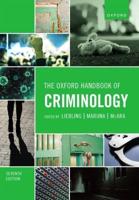Publisher's Synopsis
This book aims to advance knowledge about the recidivism of young offenders. It reviews knowledge about risk factors for recidivism and about protective factors that encourage desistance. It then reviews quantitative research on predictors of recidivism versus desistance of young offenders in Buenos Aires, Argentina, based on following up over 100 young offenders during a two-year statutory monitoring period. Numerous factors are identified that predict recidivism: family, educational, social, community, demographic, offence history, substance use history. It then presents qualitative research based on offenders' narratives, using extensive verbatim quotations, that explain their recidivism versus desistance. Finally, it reviews research on the prevention of recidivism of young offenders and makes recommendations based on the quantitative and qualitative analyses. This book should be of great interest to all academics, researchers, practitioners and policy makers who are interested in juvenile offending and recidivism, including criminologists, psychologists, psychiatrists, social scientists and criminal justice practitioners.










